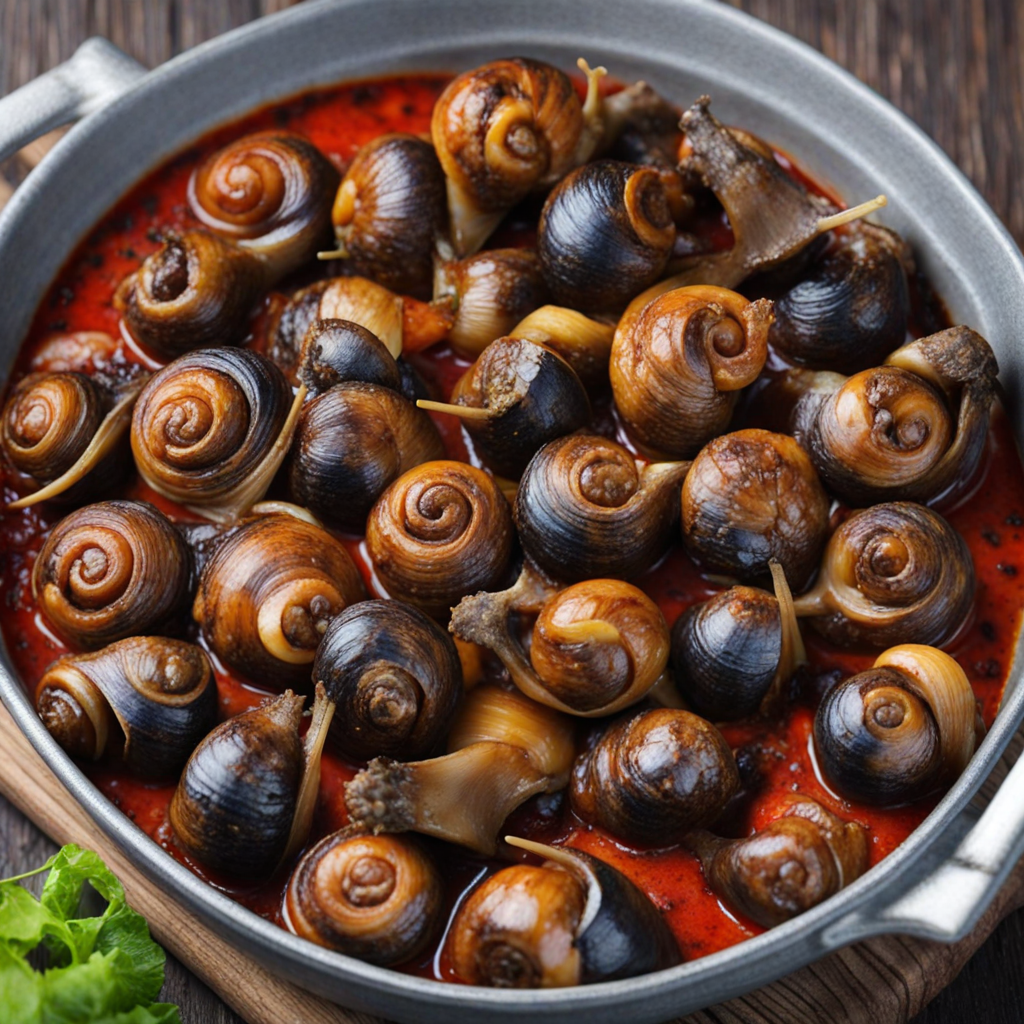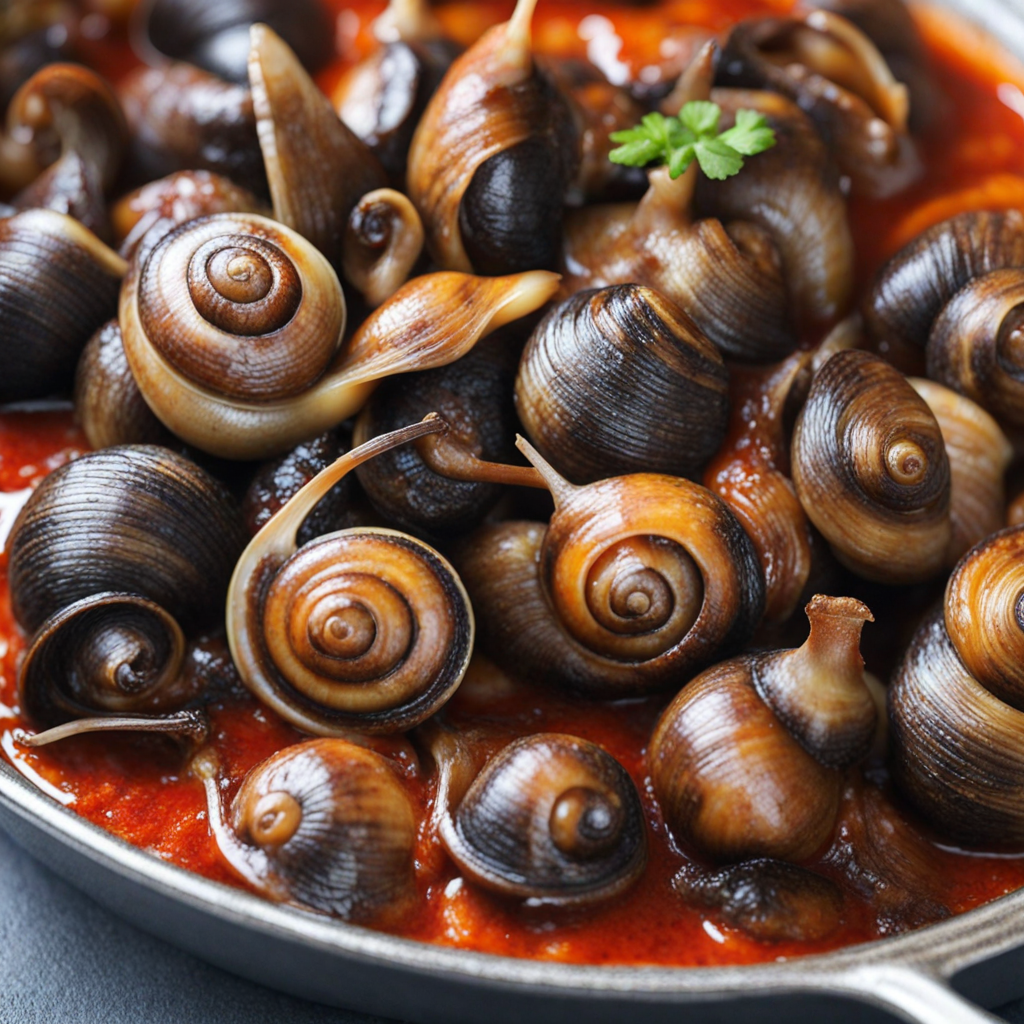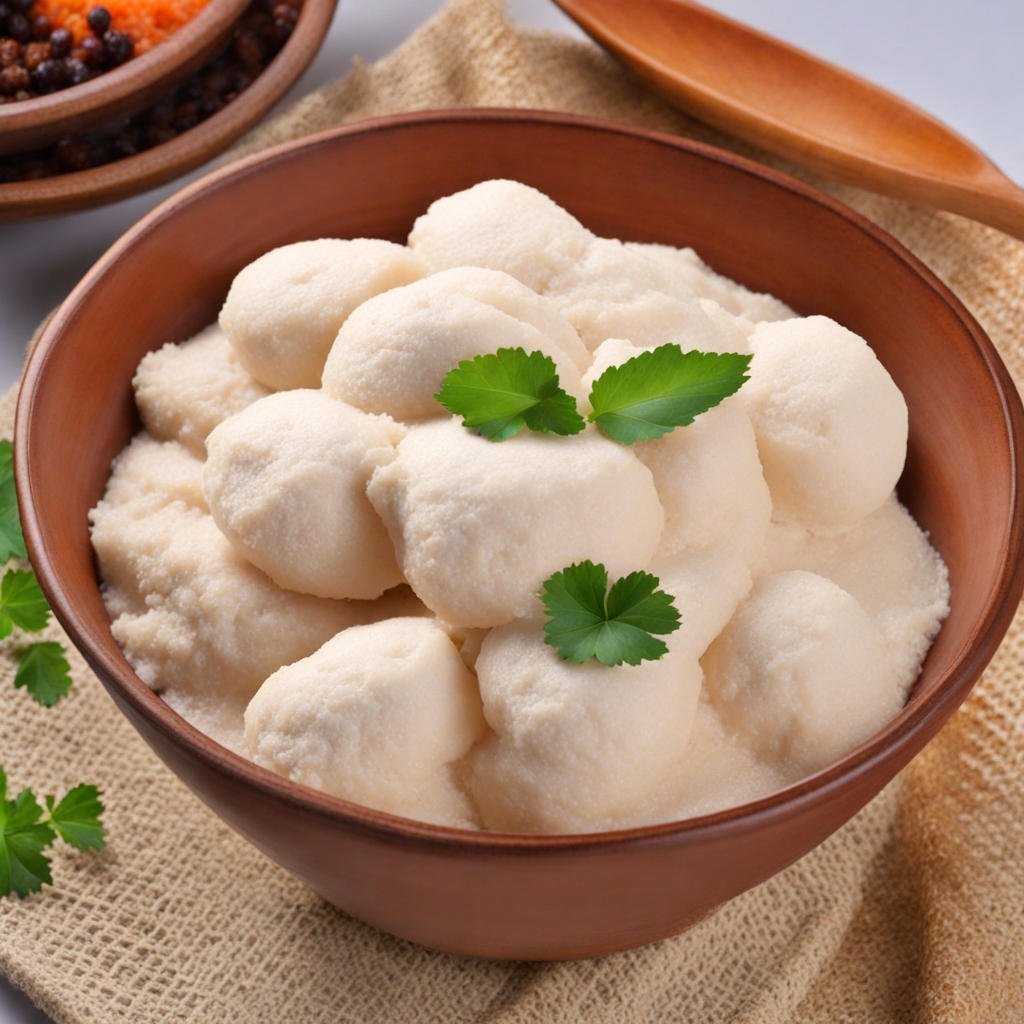Peppered Snail
Peppered Snail, known locally as "Isi Ewu," is a popular delicacy in Nigeria that showcases the rich culinary heritage of the region. This dish features snails that are typically sourced from the wild, ensuring a fresh and natural flavor. The snails are cleaned thoroughly and then cooked with a medley of spices that create a tantalizingly aromatic experience. The preparation often includes a blend of ground pepper, onions, and various local seasonings, which infuse the snails with a bold and spicy profile that excites the palate. As you take your first bite of Peppered Snail, you will be greeted by a unique combination of textures and flavors. The snails themselves are tender and slightly chewy, offering a satisfying bite that complements the fiery sauce enveloping them. The heat from the pepper is balanced by the sweetness of the onions and the savory depth of the seasoning, creating a harmony of flavors that is both invigorating and memorable. Each mouthful is a celebration of Nigerian spices that invites adventurous eaters to explore new culinary horizons. Peppered Snail is often served as an appetizer or a street food snack, enjoyed by many as a flavorful accompaniment to chilled drinks or as part of a larger meal. Its popularity has transcended regional boundaries, making it a beloved choice for gatherings and celebrations. Whether enjoyed at a bustling market stall or prepared at home for a festive occasion, Peppered Snail is more than just a dish; it is an expression of Nigerian culture and a testament to the country's diverse gastronomic landscape.
How It Became This Dish
The History of Peppered Snail in Nigeria: A Culinary Journey Origins Peppered snail, known as "snail pepper soup" or "escargot pepper soup," has deep roots in Nigerian culinary traditions. The dish primarily features the African giant land snail (Archachatina marginata), which is indigenous to the region and found in tropical rainforests across West Africa. The history of this dish is intertwined with the agricultural practices, biodiversity, and the culinary heritage of various ethnic groups within Nigeria. Snails have been a part of the human diet for centuries, dating back to ancient civilizations. Evidence suggests that snails were consumed in various parts of Africa long before the advent of modern agriculture. In Nigeria, particularly among the Igbo and Yoruba people, snails have been harvested from the wild and incorporated into traditional dishes, often signifying abundance and the connection to nature. Cultural Significance In Nigeria, peppered snail transcends mere sustenance; it embodies cultural significance and social bonding. During festivities, weddings, and communal gatherings, peppered snail is often served as a delicacy, symbolizing hospitality and generosity. Its preparation and consumption are occasions for storytelling, laughter, and the strengthening of social ties. The dish is also significant in local markets where vendors sell both live snails and prepared dishes. The sight of snails being cooked in aromatic spices elicits the nostalgia of home-cooked meals for many Nigerians. It reflects the communal aspect of Nigerian dining, where food is not just nourishment but a means of bringing people together. Ingredients and Preparation The preparation of peppered snail involves a blend of local spices and ingredients that highlight the rich flavors of Nigerian cuisine. The snails are typically cleaned thoroughly, a process that removes any bitterness. They are then boiled and cooked in a spicy broth made from a mixture of pepper (usually Scotch bonnet or chili), onions, and various traditional spices such as locust beans (iru), ginger, and garlic. The dish is often garnished with fresh scent leaves (nchuanwu) or basil, which adds an aromatic touch. The distinct blend of spices creates a bold flavor profile that is both comforting and invigorating. The dish can be served alone or accompanied by rice, yam, or plantains, making it versatile and adaptable to different palates. Evolution Over Time As Nigeria has evolved and modernized over the decades, so too has the preparation and consumption of peppered snail. Traditionally, it was a dish prepared in homes, often by women who passed down recipes through generations. However, the increasing urbanization of Nigerian society has led to a shift in how peppered snail is perceived and enjoyed. In urban centers like Lagos and Abuja, peppered snail has found its way into restaurants, bars, and street food stalls, appealing to a younger demographic searching for both nostalgia and new culinary experiences. Food entrepreneurs have capitalized on this trend, offering varied interpretations of the dish, from gourmet versions to more casual street-side servings. Moreover, the globalization of food culture has introduced new influences, encouraging chefs to experiment with the dish. Some have incorporated international flavors, creating fusion dishes that combine elements of Nigerian cuisine with global culinary techniques. This evolution reflects a growing appreciation for local ingredients and traditional dishes in the face of globalization. Health and Sustainability The emphasis on health and sustainability has also played a role in the popularity of peppered snail. Snails are a good source of protein, low in fat, and rich in essential nutrients. As health-conscious consumers seek alternatives to traditional meat sources, snails have emerged as a viable option. The sustainable harvesting of snails also aligns with global efforts to promote environmentally friendly food production practices. In rural areas, the farming of snails has gained traction as a means of livelihood. Snail farming, or heliciculture, allows for controlled breeding and harvesting, providing a steady income for farmers while ensuring that wild populations remain sustainable. This practice has led to greater awareness of the ecological importance of snails and the role they play in maintaining biodiversity. Conclusion Peppered snail is more than just a dish; it is a testament to Nigeria's rich culinary heritage and the dynamic nature of its food culture. From its origins in traditional practices to its modern adaptations in urban settings, peppered snail illustrates the interplay between culture, community, and cuisine. As it continues to evolve, it remains a cherished delicacy that brings people together, fostering connections and celebrating the rich flavors of Nigeria. In a world increasingly disconnected from its food sources, the enduring popularity of peppered snail serves as a reminder of the importance of local ingredients and traditional knowledge. Whether enjoyed at a bustling street corner or a family gathering, this dish encapsulates the essence of Nigerian hospitality and the timeless joy of sharing a meal. As we look to the future, peppered snail will undoubtedly continue to evolve, enriching the culinary landscape of Nigeria and beyond.
You may like
Discover local flavors from Nigeria







